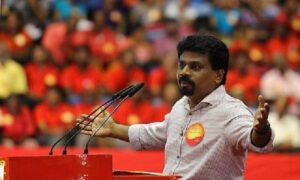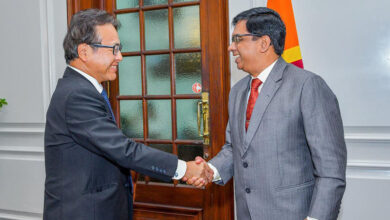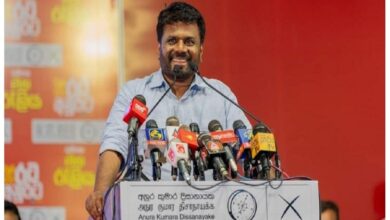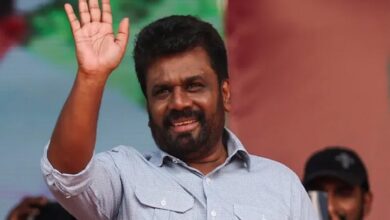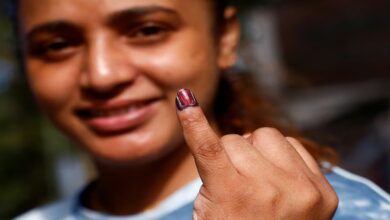Who is the new president of Sri Lanka Dishanayake?
National People’s Power (NPP) leader and Marxist politician Anura Kumara Dishanayake has won the second round of Sri Lanka’s presidential election for the first time in history. He has been elected as the new president after defeating the country’s incumbent president, Ranil Wickremesinghe.
On Sunday (December 22), news agency Reuters reported this information in a report citing local television channel.
According to the report, the Election Commission of Sri Lanka declared Marxist leader Anura Kumara Dishanayek the winner of the presidential election after the second round of vote counting on Sunday. Anura defeated the country’s ruling president Ranil Wickremesinghe by a significant margin.
Results published on the Election Commission’s website showed that 55-year-old Dishanayake won the presidency with 42.31 percent of the vote in Saturday’s election. Opposition leader Sajith Premadasa is second and incumbent Ranil Wickremesinghe third in the vote count. Dishanayak’s nearest rival Sajith Premadasa got 32.76 percent and Ranil Wickramasinghe only 17 percent.
Dishanayek is scheduled to take oath as the new president of the South Asian island nation of Sri Lanka next Monday.
Anura Dishanayake is a leader outside conventional politics
Dishanaye is expected to dissolve Sri Lanka’s parliament soon and call for new parliamentary elections. In a country that adopted liberal and free-market policies in the late 1970s, implementing the various policies adopted by Disha Naik’s coalition could be a challenge.
In 2022, the economic crisis led to a massive increase in inflation and a drop in foreign exchange reserves, which brought disaster to the lives of the Lankans. That year the country also failed to pay for food, fuel and medicine imports and declared bankruptcy.
At that moment of extreme crisis, millions of people started protesting against the government. In the end, the then president Gotabaya Rajapaksa was forced to flee the country in the face of the protests. Later the Parliament of the country elected Ranil Wickremesinghe as the President.
In more than two years, under the leadership of Ranil Wickremesinghe, the country’s government has somewhat recovered from the economic crisis. He stabilized the economy and negotiated a US$2.9 billion bailout package from the International Monetary Fund (IMF).
But to the millions of Sri Lankans who took to the streets, political change was nothing more than a transfer of power between established parties and political families. NPP and Dishanayek capitalized on this anger of the people and ran political campaigns. Many in the country see him as a new hero outside of old-fashioned politics.
However, in the early 2000s, Dishanayek’s JVP was part of the coalition government under President Chandrika Kumaratunga. He was also the minister of the ruling coalition for some time at that time. Dishanayak’s supporters say he is not accused of corruption.
But how the new president will deal with Sri Lanka’s huge economic challenges is the big question. During the election campaign, Dishanayek promised to cut taxes and utility bills. As a result, the government’s revenue will decrease and its policies will conflict with some of the terms of the IMF loan.
Senior NPP leader and Member of Parliament Harini Amarasuriya said, we will work within the comprehensive agreement reached by the current government with the IMF. However, we will discuss certain issues in detail, particularly the drastic measures.
Who is this director?
Dishanayek was born in Thambuttegama village of Anuradhapura district, 177 km from Colombo, the capital of Sri Lanka. Born in a rural middle-class family, Dishanaye graduated in science from the University of Kelaniya. He was involved in JVP politics since his student days.
He was first elected as a legislator in the country’s parliament in 2000. Later, he served as the Minister of Agriculture, Livestock, Lands and Irrigation from 2004 to 2005.
He took charge as the leader of JVP in 2014. Later, Dishanayake served as the Chief Opposition Whip in the country’s Parliament from 2015 to 2018.
The country has a history of engaging in violent politics against the JVP. After taking charge, he took various steps to restore the image of the party. In 1971 and the late 1980s, the party started insurgency inspired by Marxist politics. However, the rebellion turned violent. At least 60,000 people associated with the group lost their lives due to mass arrests, torture, abductions and massacres. Most of the party’s senior leaders, including founder Rohana Wijebira, died in the mutiny.

